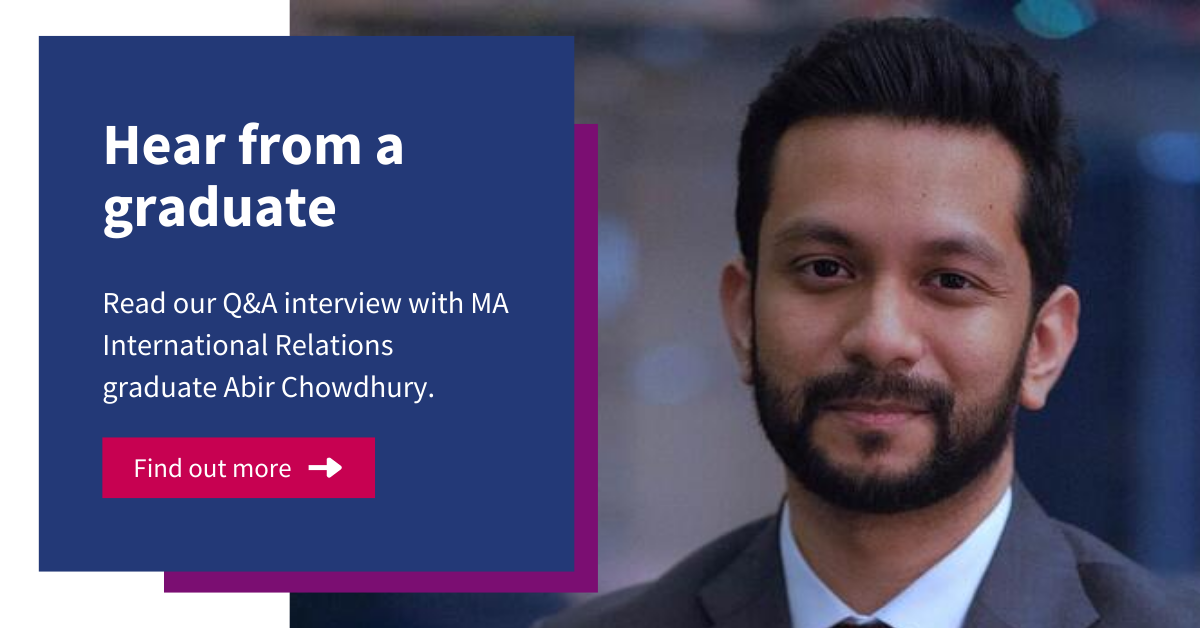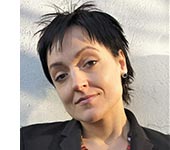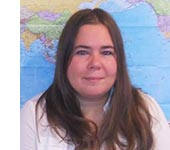This course is no longer recruiting. QMUL offer a wide range of alternative postgraduate courses which you may like to consider. A full course listing can be found here.
|
Key facts |
|
|
Format: |
part-time and online (distance learning) |
|
Tuition fees: |
£13,295 (MA); £8,850 (PGDip); £4,450 (PGCert). Payment by instalment and funding options available. Learn more about costs and ways to pay on our Fees and Funding page. |
|
Course duration: |
two years (MA); 15 months (PGDip); one year (PGCert) |
|
Annual start dates: |
Recruitment for this course has stopped |
|
Next start date: |
Recruitment for this course has stopped |
|
Application deadline: |
Recruitment for this course has stopped |
|
Time commitment: |
approximately 20 hours per week |
Why study International Relations?
Establishing yourself in the field of international relations demands the ability to think, speak, and write critically about international issues, including topics such as:
-
How has globalisation changed international relations?
-
To what extent is the international order based on conflict or cooperation?
-
How is the global financial crisis affecting international politics?
-
Do foreign military interventions in civil wars help or hinder peace-making?
-
Why are economic resources so unevenly spread across the world, and what are the prospects for global justice?
With this online, part-time Master's programme, you can look forward to developing the theoretical understanding and analytical skills needed to navigate these with confidence and consideration.
The course offers challenging and thought-provoking modules to help you formulate your answers, and a lively, intelligent group of students and academics with which to debate and exchange ideas.
What you'll study
-
Leading theories in reference to important historical and contemporary themes of world politics
-
The evolving challenges in international relations in conjunction with emerging areas of interest in the developing world
-
Discussions on the historical significance of globalisation and how it relates to issues in international relations.

What's it like to study international relations online?
We believe our students say it best.
Read our interview with current online student Padraig Downey to discover what a typical week looks like for him and the skills that have helped him make the most of the course.
You can also watch our student Sophia Chase discuss why she chose to learn online:
Why study with QMUL online?
As a member of the prestigious Russell Group, our School of Politics and International Relations is world-renowned as a major school for the study of global politics, and is led by a team of industry-leading researchers providing thought leadership and unique insights in local and global politics.
The team is committed to developing, maintaining and supporting teaching and research excellence and innovation amongst its faculty, and to fostering independent learning and critical thinking amongst its students.
It’s this team of leading academics that will teach and support you throughout your studies – ensuring you’re well-equipped with the in-depth knowledge and skills you need to understand and confidently contribute to public policy-making.
The School of Politics and International Relations
Committed to developing, maintaining and supporting excellent and innovative teaching and research amongst its faculty, the School fosters independent learning and critical thinking among our students. Its research strengths include:
-
International security
-
Conflict and war
-
Political economy of North-South relations
-
International political theory
-
Middle East politics
-
Transition from the Cold War to the contemporary post-Cold War world
-
Migration and transnational mobility
For more information about the School please visit politics.qmul.ac.uk.
Masters
Our online International Relations MA is offered on a part-time basis over the duration of two years. During that time, you will undertake four taught modules and a 12,000 word dissertation.
For each module, you will be awarded 30 credits each and you will receive a further 60 credits for your dissertation. In order to graduate you must have accrued the full 180 credits, which involves completing every aspect of the modules and passing all relevant assignments.
Postgraduate Diploma
The PGDip in International Relations is available for part time study over four semesters (two academic years). During that time, you will undertake four compulsory modules. For each module, you will be awarded 30 credits each. In order to receive your PGDip you must have accrued 120 credits, which involves completing every aspect of the modules and passing all relevant assignments.
Postgraduate Certificate
The PGCert in International Relations is available for part time study over two semesters (one academic year). During that time, you will undertake two compulsory modules. For each module, you will be awarded 30 credits each. In order to receive your PGCert you must have accrued 60 credits, which involves completing every aspect of the modules and passing all relevant assignments.
Modules
This postgraduate programme has been designed to highlight the necessity of theory to understanding world politics. As such, it is built around the core module – Contemporary World Politics: Theories, Concepts, Themes – which then leads to other areas of learning.
The modules that follow will challenge you to develop your analytical skills and subject knowledge further. You can look forward to gaining expertise within areas such as international security, international political economy, and the impact of the changes associated with globalization on the study of international relations and US foreign policy.
Contemporary World Politics: Theories, Concepts, Themes
This module is designed to provide you with a command of key concepts and theoretical traditions in international relations and an understanding of their relevance to contemporary themes in world politics.
We will evaluate political developments and statements and analyse critical themes in world politics. Through a close reading of advanced theoretical texts, you will expand your conceptual and theoretical knowledge and begin to think critically about competing interpretations of events, and longer term developments in international relations.
Online discussions will encourage you to compare and critically evaluate theoretical knowledge and to express your arguments effectively.
War and International Security
Violent conflict and the use of force remain salient issues in contemporary international relations. While some have theorised that the advent of globalisation and spread of liberal democracy would make the use of force and violent conflict less relevant to the world, war and conflict have remained an integral part of the international system, forming an obstacle to providing stability and security for many states.
In this module, we will examine how force is used by states and other actors, and how it is managed in world politics. Together, we will survey a variety of perspectives on the causes of war and peace in order to better examine the roots of violent conflicts and security problems in the present day.
A major theme of the module looks at war in a global context, not only in terms of integrating contemporary concerns with globalisation, but also by looking at interconnections between north and south, and war and society. We will also explore the responses of the international community to violent conflict, looking broadly at the contested notion of ‘Just War’, international law, and the role of the United Nations.
Overall, the module will provide you with a broad perspective on the place of armed force in contemporary international relations.
Themes and Cases in US Foreign Policy
In this module, we will consider the principal forms in which US foreign policy has been practised and interpreted since the foundation of the Republic. Amongst these are American Exceptionalism and Anti-Americanism, ‘spheres of influence’, liberal interventionism and protectionist isolationism, Cold War containment, the ‘War on Terror’ following 9/11, and the strains on uni-polarity in the early 21st century.
Case studies linked to these themes will allow us to consider the role of Native Americans and immigration, the war of 1898, gunboat diplomacy in the Caribbean, the ideas of Woodrow Wilson, the Vietnam War, the consequences of the 9/11 attacks, and the challenges posed by China.
Watch our video on the importance of the Themes and Cases in US Foreign Policy module:
Globalisation and the International Political Economy of Development
This module provides you with a detailed examination and critique of theories of globalisation, an assessment of contemporary globalising processes, and how these particularly influence the developing world.
We will examine the analysis of contemporary manifestations of ‘globalisation’, including neo-liberalism, US hegemony and contemporary imperialism, capital flows, global commodity chains, state-market relations, patterns of global inequality, international institutions, and questions of cultural homogenisation/imperialism.
The module also looks at the ways in which ‘globalisation’ is resisted, focusing on the rise of transnational social movements and NGOs, and the politics of ‘anti-globalisation’, and how this relates to an ostensibly ‘post-development’ era.
In addressing these issues, the module concludes by asking the most important question: how do we think of ‘development’ in an era of ‘globalisation’, US hegemony, neo-liberalism and imperialism?
Dissertation (MA only)
The title and subject of your dissertation will be agreed by your assigned tutor. A dissertation is only required if you study the full masters programme.
Watch our video on the International Relations MA learning outcomes:
Entry requirements
The usual entry requirement for the International Relations MA (Online) is for a 2.1 honours degree or international equivalent in a relevant subject, such as politics, international relations, history or economics.
However, if you have a 2nd class degree and at least three years' relevant work experience, we may also consider your application.
If your first language is not English, you should also have one of the following:
-
IELTS Academic: 7.0 overall including 6.5 in Writing, and 5.5 in Reading, Listening and Speaking.
-
TOEFL: 100 overall including 24 in Writing, 18 in Reading, 17 in Listening and 20 in Speaking.
-
PTE Academic: 68 overall including 68 in Writing, and 51 in Reading, Listening and Speaking.
Please visit the Alternative English Language Qualifications page on the main Queen Mary website for more information on language requirements.
Get advice from an IELTS examiner on taking your IELTS English Language test:
Read the transcript for this video
Taking your IELTS English Language test?
Here are top tips from an IELTS examiner on how to prepare for each section and perform at your best on exam day.
4 skills are tested in the IELTS exam:
-
Reading
-
Listening
-
Speaking
-
Writing
Advice for reading
-
Read newspapers and academic journals regularly to help improve your vocabulary and reading speed
-
Download IELTS practice tests from the ielts.org website to learn how to identify the easiest questions
-
During your exam, read through the paper in full initially and identify which questions are easier for you
-
Start with the easier questions to guarantee yourself some marks and help you feel confident
Advice for listening
-
Listen to the radio, TV and YouTube videos to help you understand various accents
-
Practice your spelling of names, numbers and addresses
Advice for speaking
-
Speak in English as much as possible in your day-to-day life
-
On the day of the exam, see if you can speak in English to another candidate outside the exam hall, to put yourself at ease
Advice for writing
-
Practice writing academic papers and get feedback from a teacher or professor if you can
-
Get to know the band descriptors IELTS examiners use to mark your writing – you can find these on the ielts.org website
-
Identify the areas you need to improve on and practice these before your exam
-
During your exam, make sure you answer the question that’s being asked and complete all parts of the task
And finally...
Leave yourself plenty of time to prepare! If you can, try to book your exam at least six weeks in advance to give yourself enough time to practice the different skills. Practice makes perfect with the IELTS exam.
Taking your English language requirement test at home
The following at-home tests are also being accepted for entry:
-
HOME TOEFL: 100 overall including 24 in Writing, 18 in Reading, 17 in Listening and 20 in Speaking.
-
IELTS Indicator Test or IELTS Online Test: 7.0 overall including 6.5 in Writing, and 5.5 in Reading, Listening and Speaking.
-
PTE Academic Online: 68 overall including 68 in Writing, and 51 in Reading, Listening and Speaking.

How you are assessed
As a student at Queen Mary Online, we ask you to play an active role in your acquisition of skills and knowledge. We use a mixture of online tutorials, discussion forums and group webinars designed to generate informed discussion around set topics.
I enjoy the mix of different types of information-delivery and activities, such as the reading exercises, lectures, webinars and commentary from experts. I have also found the reading lists very useful for providing a broader view of topics covered in each lecture.
International Relations MA student, Queen Mary Online
Assessment for the International Relations (Online) programme is by coursework only. There are no exams - our focus is on helping you develop essential data-gathering and research skills. You can look forward to producing work that represents your true academic ability, not just what you can memorise at the time.
Your module leaders will set assessments appropriate to the content of their module which will usually take the form of a research essay or critical evaluation. They will also be available to advise and support you throughout the course.
The final dissertation (MA only) will involve more in-depth study and independent research on a topic agreed with your supervisor. Past topics of dissertations included:
-
The global financial crisis: a failure of governments or markets?
-
Is the UN fit to prevent genocide?
-
Is China a good trade partner for Latin America?
-
From Actions to Policy: A Theoretical Shift in U.S. Counterinsurgency Security Operations during the War on Terror in Iraq
-
Is China Challenging US Economic Hegemony?
-
Tackling cultures of immunity: how can the United Nations effectively address the practice of sexual abuse and exploitation by military peacekeeping forces?
-
Militarizing Egypt’s Policy making arena: The Army between Socialism and Neoliberalism
-
Postcolonial President? Barack Obama and Humanitarian Intervention
-
Globalisation, Inequality and Underdevelopment: The Myth of Economic Convergence
Independent study
At Queen Mary Online, we take your studies seriously and in return, we hope you will do the same. Each week you will need to invest additional time on individual study. This could be spent preparing for, or following up on formal study sessions; reading; producing written work; completing projects; and undertaking research for you dissertation.
The direction of your individual study will be guided by the formal study sessions you attend, along with your reading lists and assignments. We expect you to demonstrate an active role in your own learning by reading widely and expanding your knowledge, understanding and critical ability.
Independent study helps foster the ability to identify your own learning needs and determine which areas you need to focus on to become proficient in your subject area. This is an important transferable skill and will help you throughout your working life.
Resources and services
Our online students enjoy the same status as those who attend the Queen Mary campus. You will have access to our extensive online resources and if you are able, are welcome to attend any of the extra-cirricular events run by various research centres to complement your studies.
In addition, you will benefit from dedicated tutor support, enhanced online material, and a range of interactive features. There will be lively online discussions with your peers and webinars led by members of the academic staff, all accessible at the times that suit you.
You'll also be able to turn to our helpful Student Adviser team once you enrol. They will help you with any non-academic questions.
Teaching team
As a member of the Russell Group, Queen Mary is committed to the highest quality teaching and research.
Our research-active staff ensure the content of our programme is dynamic, responding to the latest global events in their respective modules. Our staff have regional expertise in South America, South East Asia, the Middle East, and Sub-Saharan Africa.
Together, they hold internationally recognised research strengths in the politics of the developing world, globalisation and development, conflict and war, migration and transnational mobility, security and critical and post-colonial theory.
Co-Programme Directors
Professor Jef Huysmans

Jef Huysmans is Professor of International Politics. After finishing his PhD at the University of Leuven (Belgium), he took up a lectureship in International Relations and European studies at the University of Kent at Canterbury. Later he moved to the Open University where he taught politics and international relations and was Director of the Centre for Citizenship, Identities and Governance. He joined Queen Mary University of London in January 2016.
He is best known for his work on the politics of insecurity, the securitization of migration, and critical methods in security studies and IR. Currently he is working on security and democracy in times of surveillance, the political life of methods, and the political significance of little nothings.
He was Co-Editor-in-Chief of the ISA journal International Political Sociology from 2012 until 2016.
Full staff profile
Dr Diego de Merich

Diego joined the School of Politics and International Relations in 2017. He is an alumnus of the United World College of the Adriatic, Italy, and the University of British Columbia, Canada. He completed his PhD in International Relations at the London School of Economics in 2015, with a dissertation on the critical ethics of international development.
In 2015/16, he was responsible for a mainstreaming review of the LSE100 syllabus, which resulted in the largest equalities initiative of its kind in UK higher education. He was awarded departmental teaching prizes in 2014 and 2016.
Diego’s research interests include the ethics of care; human empathy and affect in moral theory; the ethics of international development, and intersectionality mainstreaming practices around the world. He is a Fellow of the Higher Education Academy and became DL Programmes Coordinator for SPIR in 2021. He recently completed a co-authored textbook, Global Politics: Myths and Mysteries (Oxford University Press, 2022).
Tutors
Lisa Otto

Lisa was awarded her PhD by the University of Johannesburg in 2016, having conducted research on the nexus between natural resource governance and transnational organised crime at sea in the Gulf of Guinea. Since then, she has worked in academia in the United Kingdom and South Africa, teaching in various subjects of Politics and International Relations at both undergraduate and postgraduate levels.
Her current research interests span themes of non-traditional threats to security, specifically issues in maritime security, as well as diplomacy. Her edited volume Global Challenges in Maritime Security: An Introduction was published by Springer in 2020, and she is currently Co-Editor in Chief of the journal African Security Review.
Dr Nevena Nancheva

Nevena Nancheva is a recognised Fellow of the Higher Education Academy and has been teaching International Relations at the Master's level since 2010. Her leading research interest is nationalism in the European context. She has written on European integration, EU security and migration governance, national minorities, refugee migration, and recently, on nationalism and the construction of 'national' food.
Nevena's 2016-17 research project EU Migrants in the UK: Political Community, Identity and Security is funded by the British Academy/Leverhulme Trust. She is the co-founder of an academic research network on EU migration (eu-migrants.net) hosted by the Centre for Research on Communities, Identities and Difference at Kingston University London.
Dr Alice Martini

Alice has a PhD in International Relations from the Sant’Anna School of Advanced Studies, Italy, and, jointly, the Autonomous University of Madrid, Spain. Among other publications, she is the author of The UN and Counter-Terrorism: Global Hegemonies, Power, Identity (Routledge, 2021) and co-editor of Encountering Extremism (MUP, 2020).
Her research examines and deconstructs global discourses on security, (counter)terrorism and (counter)extremism, looking into the resulting practices of power and international hegemonies.
She lectures on Critical Security Studies, Critical Terrorism Studies, and, more broadly, International Relations and Global Politics theories.
Before her PhD, she collaborated with the Human Rights Office of the Spanish Ministry of Foreign Affairs and Cooperation.
Dr Olanrewaju Olaoye(AKA Larry)
 Larry’s interest in teaching, research and consultancy has developed as a result of 15 years of professional experience within the public sector, private sector and third sector working in different levels of complexity while trouble-shooting and proffering solutions to real-life work problems.
Larry’s interest in teaching, research and consultancy has developed as a result of 15 years of professional experience within the public sector, private sector and third sector working in different levels of complexity while trouble-shooting and proffering solutions to real-life work problems.
He has worked with the World Health Organisation, UNICEF, Laureate Online Universities, the British Council and Chevening and is a subject specialist in Public Policy, Governance and Strategy Making. He is currently working on an ongoing project (delivered with KRIU-Kazakhstan) funded by the British Council Creative Sparks Award aimed at developing the Enterprise sector in Kazakhstan
Dr Paul Hayman

Paul Hayman is a recognised Fellow of the Higher Education Academy, with a PhD in International Theory/Political Philosophy from the School of Government & International Affairs at Durham University. He also holds a Master’s in International Studies from the same department and a Law degree from Northumbria University.
He has lectured at Durham University in political sociology, where he also supervised postgraduate dissertations. He currently holds a senior position at The Open University, managing teaching and learning in Politics and International Studies in the largest academic faculty in Europe. He has a wealth of online teaching experience, supporting students across a range of disciplines and issue-areas, including international relations, political ideas, public policy, social theory, and development studies.
Dr Haro Karkour

Haro Karkour is a recognised Fellow of the Higher Education Academy and has been teaching online modules at Masters level since 2012. He has completed his PhD in politics at the University of Leicester with the thesis entitled 'Kosovo, Libya, and the problem with depoliticisation in the theory and practice of post-Cold War Humanitarian Intervention.
Haro's research is focused on International Relations (IR) theory. He is currently looking at classical realism and its application to US foreign policy, the liberal international order and the 'Global IR' debate. His research has been published previously in IR journals such as International Relations and Journal of International Political Theory.
Read Haro's blog post on how IR students can interpret the G7 Summit in Cornwall >
How could Queen Mary's International Relations MA (Online) benefit my career?
You will gain substantive knowledge about the history of the international system and how it is developing so that you have a view on the broader context in which companies, non-governmental organisations, charities, and so on operate in the world.
Jef Huysmans, International Relations MA Programme Director
Queen Mary University of London is a member of the Russell Group of leading universities. Studying online with us gives you access to the highest quality of teaching and research, empowering you to achieve lifelong career success and make a global impact.
What career-relevant skills will I develop?
This course doesn’t train you for a specific job, but it gives you knowledge and transferrable skills that you can apply to a variety of roles in international relations.
You will get a broad understanding of international relations and how people in the international community analyse the world. For instance, how do changes in the international global economy impact on government policies? This knowledge will help you operate in various international settings.
You will gain the ability to listen to or read complicated material and pick out the core arguments quickly. You will also learn how to communicate your ideas and arguments effectively, both verbally and in writing. These are skills many employers value.
What additional career support is available from Queen Mary?
As an online student, you'll have access to QM Careers and Enterprise throughout your studies and for up to two years after you graduate. The service offers information and guidance on a wide range of topics, from choosing a career to finding work experience and starting your own business.
Find out more about career guidance for Queen Mary Online students on our Career Support page.
What benefits does the reflective journal provide?
Throughout the course, you are encouraged to complete a journal to help you reflect on what you’re learning each week.
At the end of the MA, you should be able to look back at your journal and articulate what skills and knowledge you’ve developed. This can be hugely beneficial when completing job applications or writing reports at work.
How will the dissertation help me present my achievements to potential employers?
Your dissertation is an opportunity to analyse a challenge related to the programme content in your current employment or somewhere you want to target as a potential employer.
For example, if you want to work in humanitarian aid after your degree, you could investigate an issue an aid charity is facing and write a report offering solutions. That report could be something you write about in job applications or take with you to interview.
The theoretical understanding and transferrable skills you develop on the MA can not only help you perform better within your current role, but also make you very attractive to a range of prospective employers.
We’re not just studying to get a piece of paper; I want to develop as a human being. Queen Mary, in my dealing with the teachers and the students, is just making us better people who can bring that into our societies and contribute to their enrichment
Padraig Downey, International Relations MA student
What careers have graduates progressed to?
Graduates from our programmes progress to diverse positions of responsibility in government, non-governmental organisations (NGOs), international organisations and the not-for-profit sector as well as broader roles in the media and finance sector. They also go on to careers in academia and our programmes help students develop the required research skills.
Examples of roles graduates of our online MA have gone on to work in include:
-
Deputy Private Secretary, UK Ministry of Justice
-
Foreign Policy and Diplomacy Assistant, Embassy of Canada
-
Global Affairs Researcher, b’huth (Dubai Public Policy Research Centre)
-
Senior Analyst, Bank of England
-
Senior Consultant, Inter-American Development Bank
-
Senior Policy Planner, UK Foreign, Commonwealth and Development Office
Source: LinkedIn